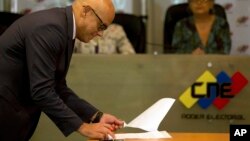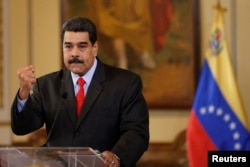Venezuela’s ruling socialists and some opposition parties have agreed to delay the nation’s presidential election by a month to the second half of May.
Venezuelan officials say the agreement between the government of President Nicolas Maduro and several smaller opposition parties is intended to give candidates more time to campaign and to allow millions of Venezuelan exiles to register to vote abroad. They say it should also pave the way for a jointly proposed team of electoral observers from the United Nations.
The decision to delay the vote was widely interpreted by critics of the government as an attempt to steamroll the deeply divided opposition coalition and throw it into disarray.
The main opposition coalition, which is boycotting the poll, is calling it a farce intended to legitimize a “dictatorship.”
The presidential election comes amid an ever worsening economic and political crisis that has left many Venezuelans malnourished and has led hundreds of thousands to flee the country.
Maduro is running for a second six-year term.
The plan to delay the national poll comes as U.S. President Donald Trump is considering more sanctions against Venezuela. The U.S. has sanctioned dozens of top officials, including Maduro himself, and has called the snap election further proof of the president’s intention to dismantle Venezuela’s democracy.
The sanctions are reportedly still under discussion, and could be implemented both before and after the election. Officials will consider how the measures would impact Venezuelan citizens.
Speaking to reporters Thursday, State Department’s spokeswoman Heather Nauert said that the U.S. is keeping all options open “to restore democracy to Venezuela, including individual and potentially financial sanctions.”
The U.S. is considering “a lot of different economic and diplomatic options in dealing with Venezuela,” Nauert said, aiming to force the country to “return to its constitution” as the U.S. has been observing “the situation deteriorate in Venezuela over the past year or so.”






